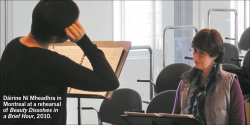 Queen of Puddings Music Theatre announced on February 8 that it would conclude operations at the end of August of this year. For many it comes as a shock that Toronto should be losing a company that for the past 20 years has brought an uncompromising vision to the development and production of new Canadian chamber opera. Their legacy is a series of works, acclaimed by critics and audiences alike, which have redefined not only what a Canadian opera can be but also what opera itself can be. Beatrice Chancy (1998–1999) by James Rolfe and George Elliott Clarke was the first opera about black slavery in Canada and launched the career of soprano Measha Brueggergosman. The Midnight Court (2005–2007) by Ana Sokolović and Paul Bentley was the first Canadian opera — and QoP the first Canadian company — invited to the Linbury Studio at England’s Royal Opera House, Covent Garden.
Queen of Puddings Music Theatre announced on February 8 that it would conclude operations at the end of August of this year. For many it comes as a shock that Toronto should be losing a company that for the past 20 years has brought an uncompromising vision to the development and production of new Canadian chamber opera. Their legacy is a series of works, acclaimed by critics and audiences alike, which have redefined not only what a Canadian opera can be but also what opera itself can be. Beatrice Chancy (1998–1999) by James Rolfe and George Elliott Clarke was the first opera about black slavery in Canada and launched the career of soprano Measha Brueggergosman. The Midnight Court (2005–2007) by Ana Sokolović and Paul Bentley was the first Canadian opera — and QoP the first Canadian company — invited to the Linbury Studio at England’s Royal Opera House, Covent Garden.
In contrast to these narrative-based works, QoP also explored the boundaries of opera. Love Songs (2008–2011) by Ana Sokolović, a solo opera that set various love poems and the words “I love you” in more than 100 languages, was declared the best production at the Zagreb Biennale and was subsequently presented at the prestigious Holland Festival. Beauty Dissolves in a Brief Hour (2010) by Pierre Klanac, John Rea and Fuhong Shi, presented three poems in medieval French, English and Mandarin in the form of a ritual that was hailed by EYE Weekly as “an exquisite piece of music theatre.” In 2012, co-founder and co-artistic director Dáirine Ní Mheadhra was awarded the Canada Council Molson Prize in the arts in recognition of her lifetime achievements and ongoing contributions to the cultural and intellectual life of Canada.
Why should Ní Mheadhra and co-founder and co-artistic director John Hess choose to end such an enterprise when it has reached the peak of its success? In some ways the question answers itself. The co-founders have decided that Queen of Puddings should end on a high note.
In an email interview near the end of last month, Ní Mheadhra agreed that she and Hess would answer a number of questions about QoP, its legacy and the future. Here it is:
Why did you decide that QoP should cease operations? Do you feel that QoP has achieved all the goals it was set up to achieve?
We decided that QoP should cease operations because after nearly 20 years we feel we’ve achieved what we set out to do, which was to commission and produce original Canadian opera to a high artistic standard and to develop an international profile for this work. In this current season the company is thriving, with the great success and critical acclaim for our production of Ana Sokolović’s opera Svadba-Wedding, now touring nationally and internationally. Coming up on April 30thwe are presenting the premiere of a new vocal chamber work, Inspired by Lorca, by composer Chris Paul Harman, sung by Krisztina Szabó with our ensemble at the Richard Bradshaw Amphitheatre.
We’ve been considering our decision for some months, and while we realize that it’s unusual to cease operations when an organization is extremely healthy, it felt like the right decision for us both in this phase of our lives and in the life cycle of QoP. The end of our season in August 2013 feels like a very natural artistic ebbing point, and it also coincides with the end of our current three-year operational funding, and thus feels like the right moment to close the company. We want to conclude in a year like this, which is full of artistic highlights and the fulfilment of our goals — with continued financial stability due to a deficit-free track record.
What do you feel are QoP’s greatest achievements over its existence?
Probably our greatest achievement has been never to accept “received wisdom” about the state of new music/opera in Canada, but to have furrowed our own path with our individual beliefs. Just one example: when Dáirine arrived in Toronto from Ireland in 1994 we were told that there were only two singers in Toronto who could possibly sing new opera. We thought that was a load of old rubbish. It would never have occurred to us to segregate new opera from middle opera or old opera. For us it’s all a continuum — Monteverdi, Mozart, Puccini, Strauss, Shostakovich, Andriessen, Sokolović, Rolfe ... and the singers who sing those operas also sing contemporary Canadian opera — there’s no difference.
We think another very important achievement has been the international touring we’ve done of new Canadian opera, which hardly existed before QoP. That was hugely important to us. Before Dáirine came to Canada, she had no real impression of what new Canadian music was like as it didn’t have a strong profile internationally. But we’ve discovered that the best singers in the world live in Canada and that there’s huge composer talent here too. It has been our mission to deliver this news to the world!
For example, we’ve wanted to bring Ana Sokolović’s music back to her Serbian homeland for ten years, and last October we felt such inordinate pleasure walking down a main street in Belgrade with a big poster of Ana and Queen of Puddings outside the Atelje 212 Theatre announcing a performance of Svadba that night. In the performance the singers sang Serbian so well that we were asked how we ever managed to find six Serbian-Canadian singers! Shortly afterwards, we brought Svadba to Dublin (Dáirine’s hometown) and the audience could not believe the virtuosity of the singers and the sheer imagination and verve of the music. But all of this we knew all along, and knew that audiences outside of Canada just needed to hear these Canadian singers and music, and they would be bowled over. And they certainly were.
Are you worried that the gap left by the departure of QoP
will leave a gap in the creation of new opera in Canada,
or are you confident that QoP’s success as a deficit-free arts organization has left a model that others can build on?
We’d never have the hubris to think that we’d left a gap in new opera in Canada! People are very resilient and if there is a gap, it would be filled sooner or later. Now the deficit-free business, well that’s another story! That was a personal aesthetic — we would have been mortified to ever show up at a board meeting announcing that we’d gone into deficit. So along with our producer Nathalie Bonjour, we just made sure we never spent more than what we thought we could fundraise.
What will happen to the many works that QoP created? Will other companies have permission to perform them, or will they disappear along with the company?
QoP has an excellent track record of repeat performances of new operas. When we commission a new opera, we have exclusive rights for a few years after, but that being said we’ve never turned anyone away who wanted to do their own production of a QoP work. That’s what we all want — more productions of new operas! Just last week, the Peabody Conservatory in Baltimore presented their own production of Svadba and in fall 2013 there will be another US production of Svadba. Our 2009 production, Love Songs, has already had three other versions performed in Canada with a fourth coming up in a few months. And so on. We consider the new operas we have commissioned as living organisms which will continue to be performed well into the future and form a vital part of the emerging canon of Canadian opera.
What plans do you have for the future?
John has a recital with soprano Erin Wall on March 7 at the St. Lawrence Centre in Toronto and then a BC recital tour with Ben Heppner. For Dáirine, she’s been approached about a few projects, but in the short term she’ll probably take a break after August 31st and fuel the imagination with walks in the mountains in County Kerry and long coffees on the Avenida da Liberdade in Lisbon. Then she’ll start having ideas for new projects and be back knocking on someone else’s door!
Let me give you my deepest thanks for truly enlivening the world of opera in Canada.
We’ve had a marvellous run of 20 years and experienced huge generosity, support and warmth from our friends and colleagues in Canada. They’ve all been integral to our work and we couldn’t have given the best of ourselves without their belief that we would do no less.
Christopher Hoile is a Toronto-based writer on opera and theatre. He can be contacted at opera@thewholenote.com.



